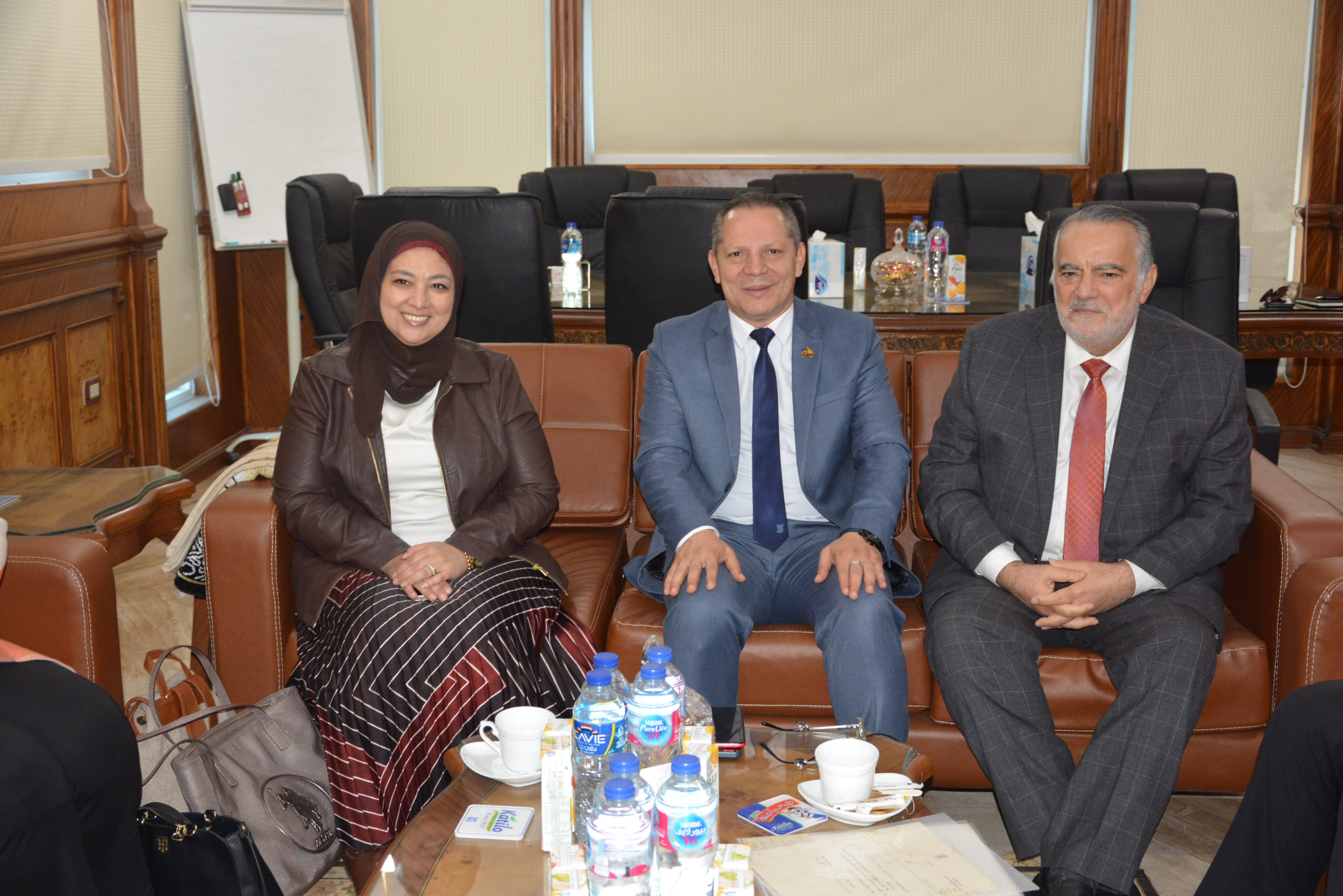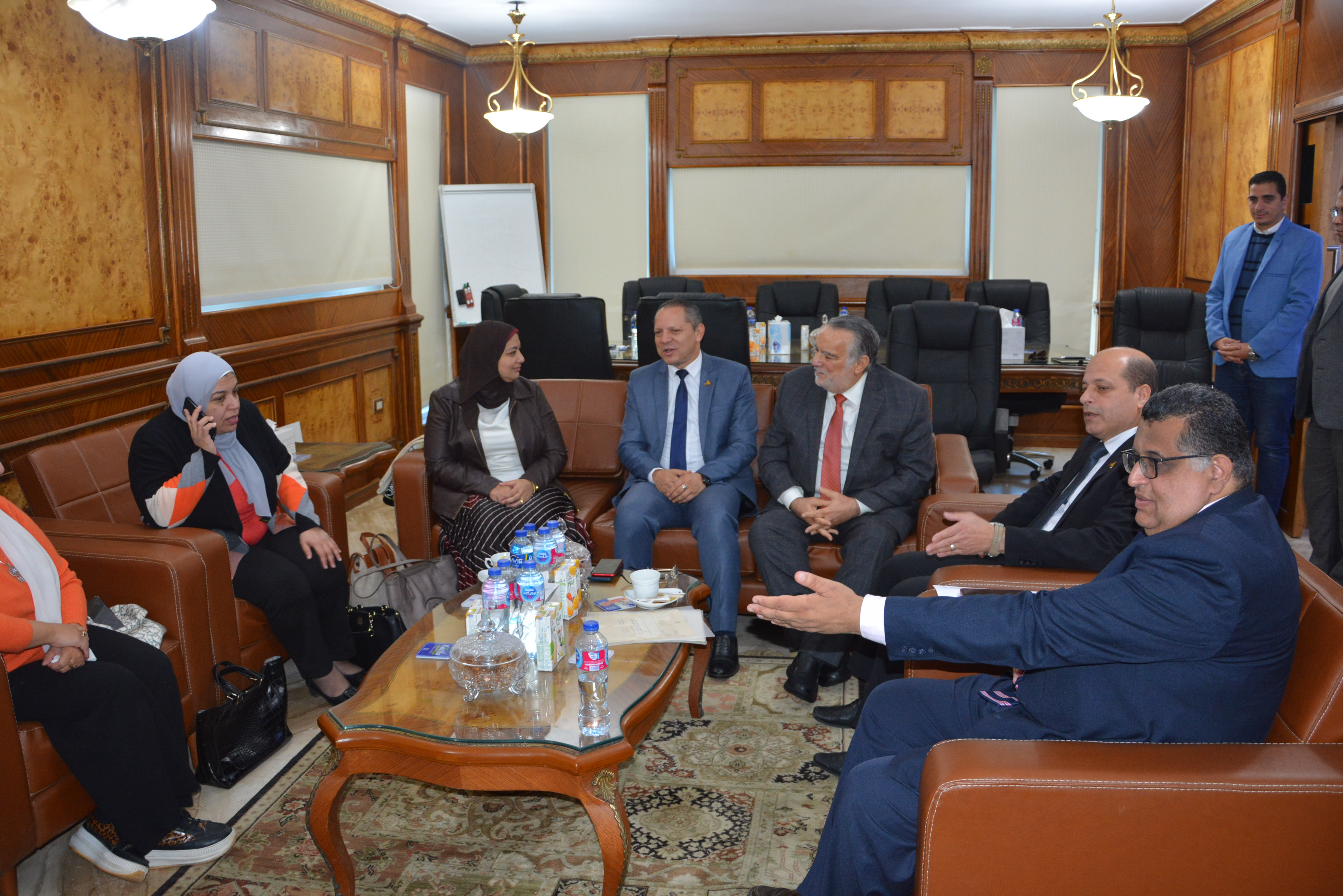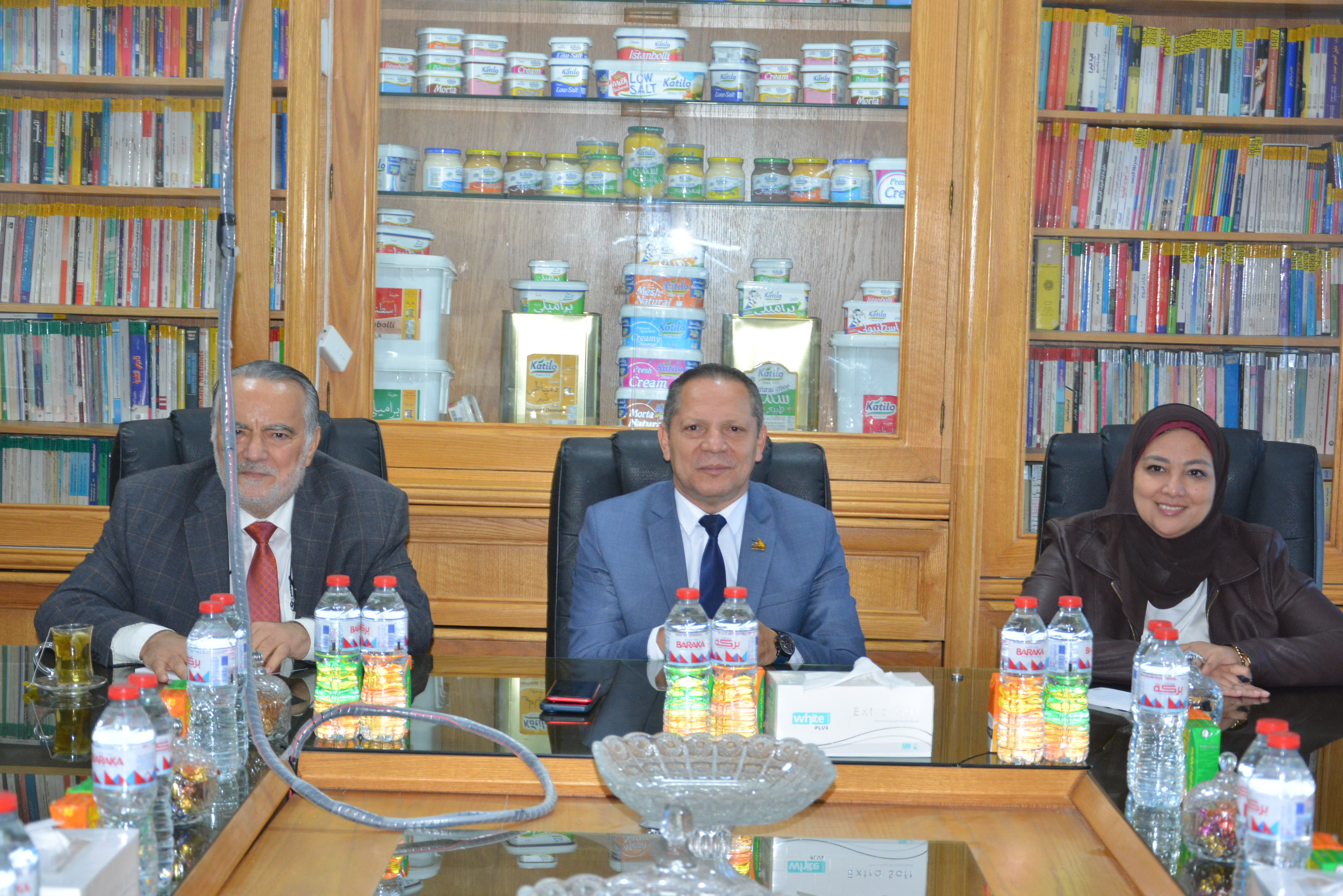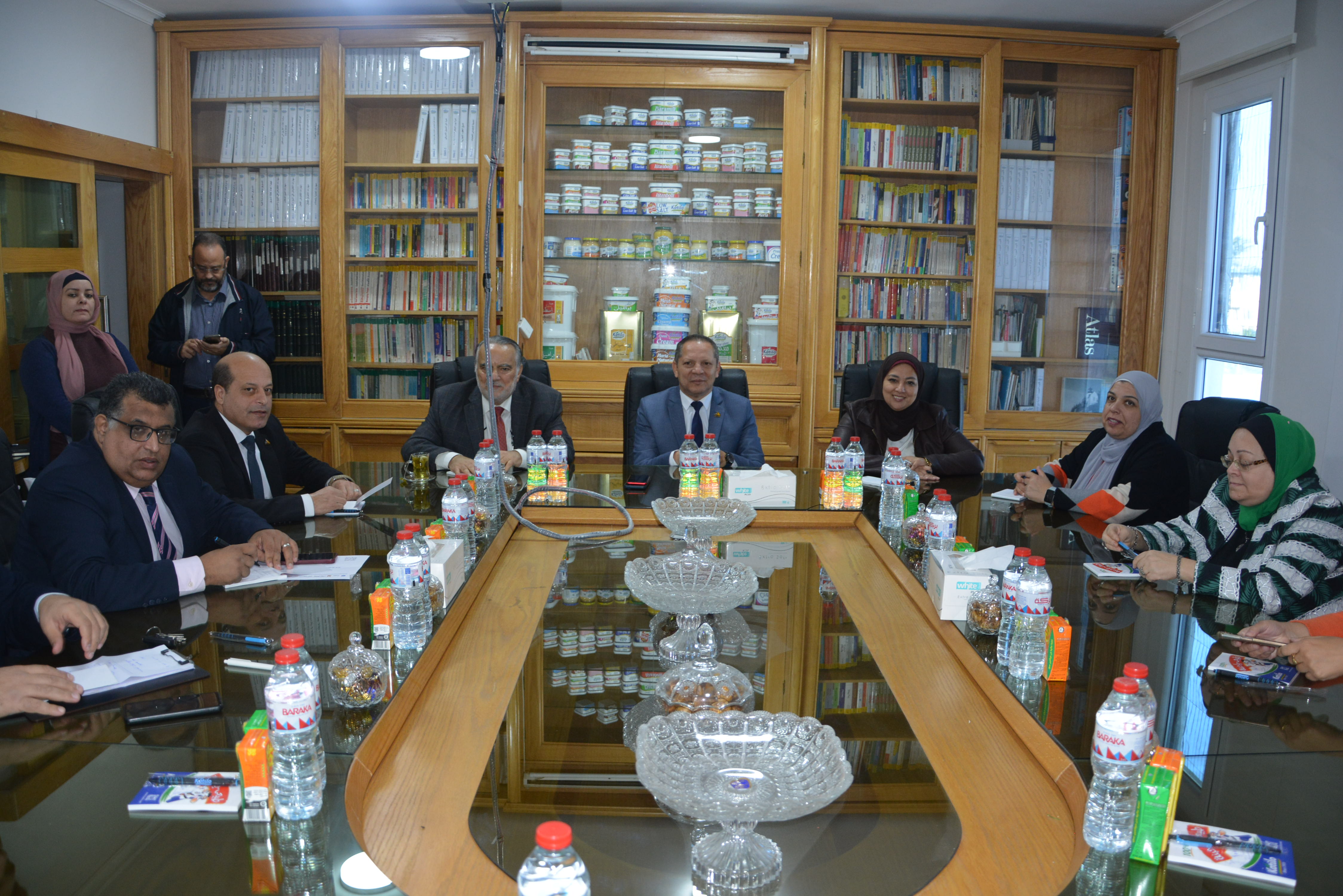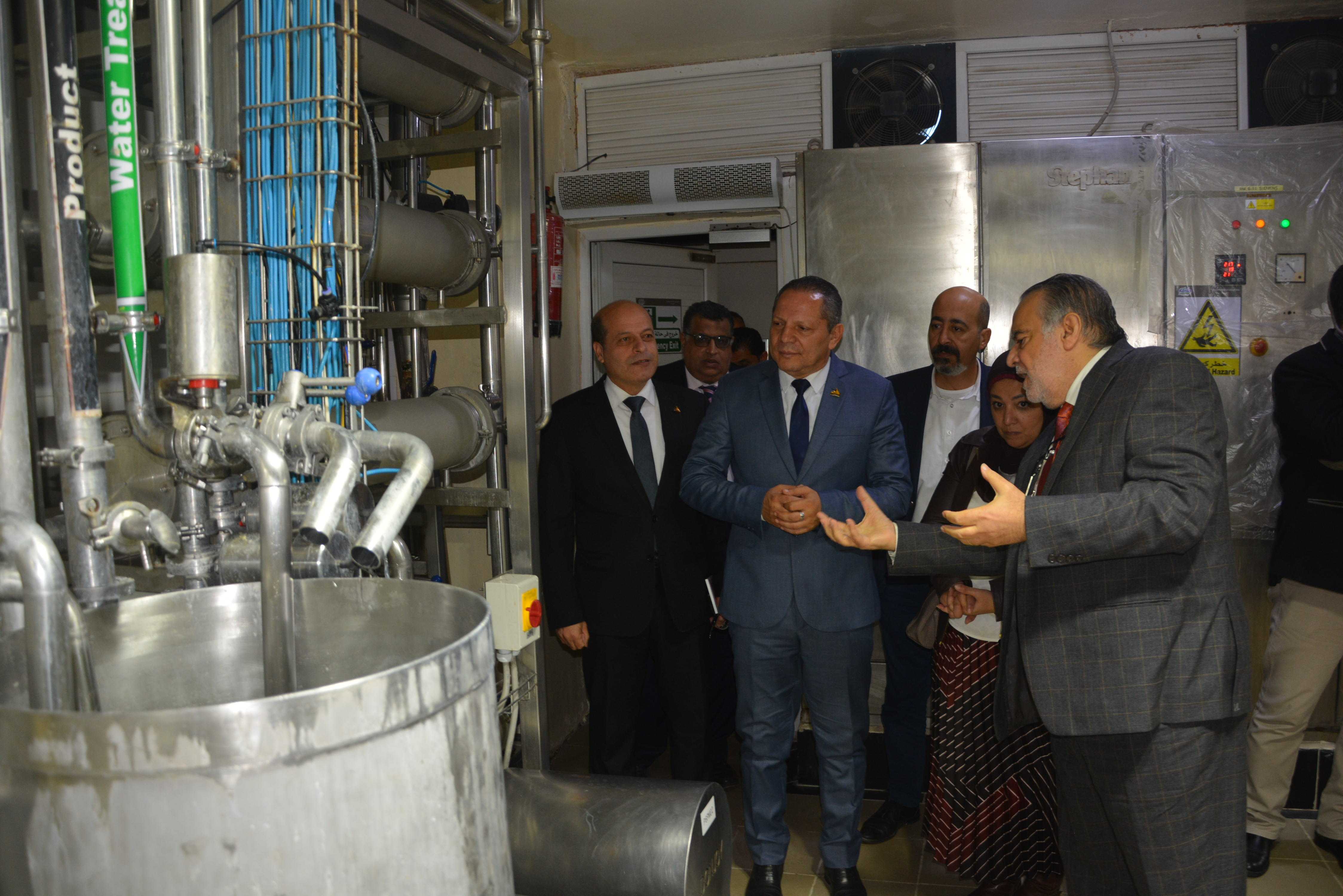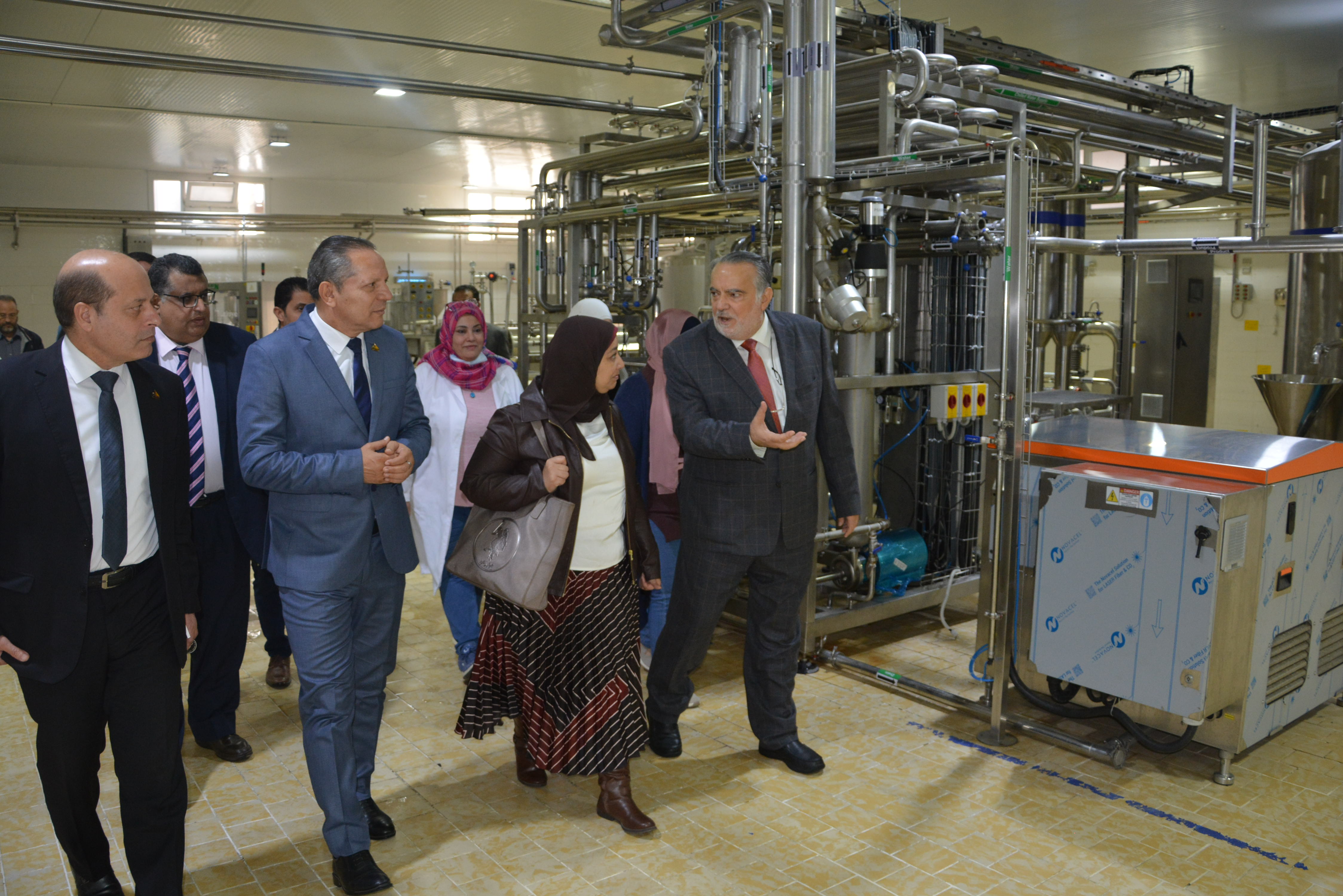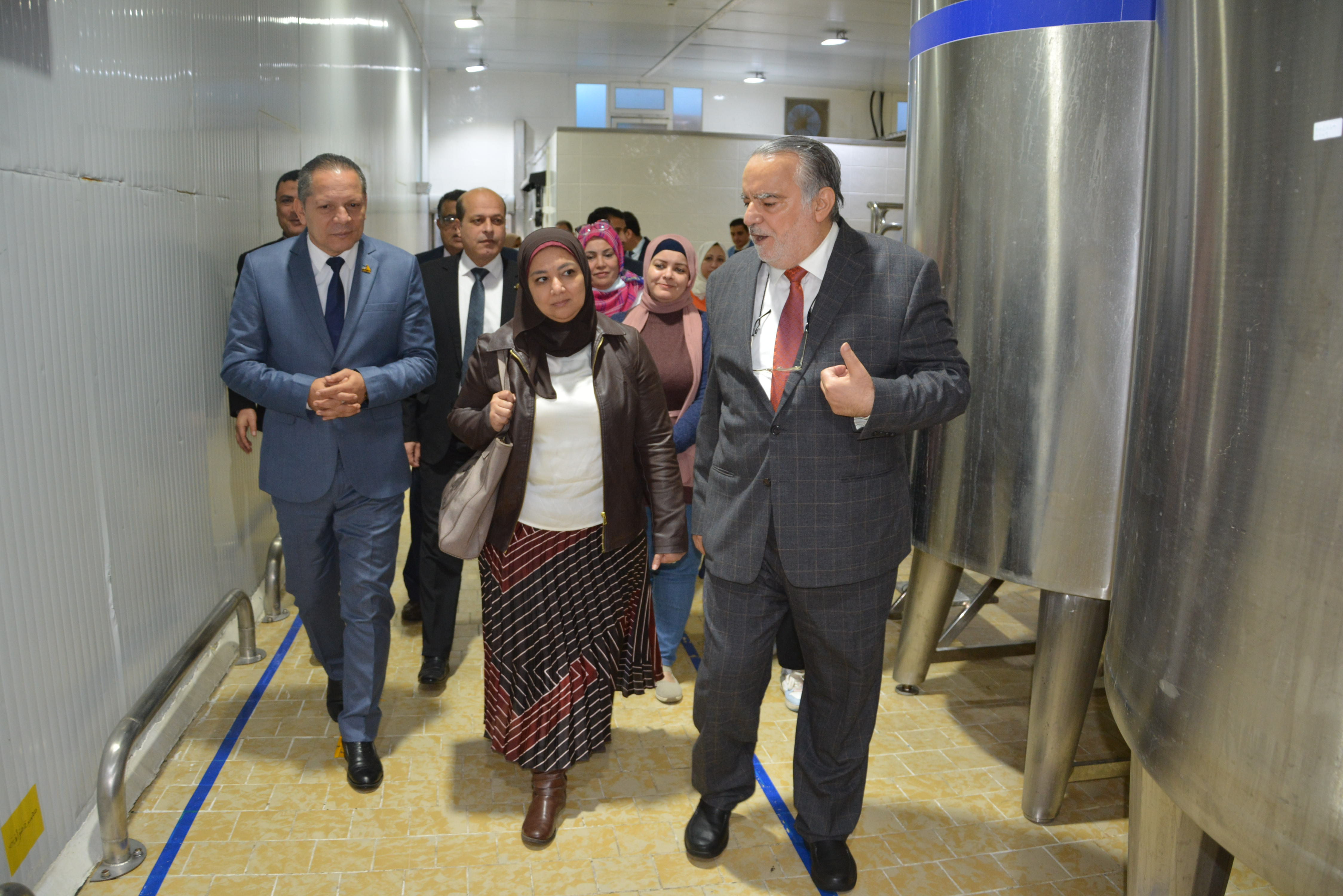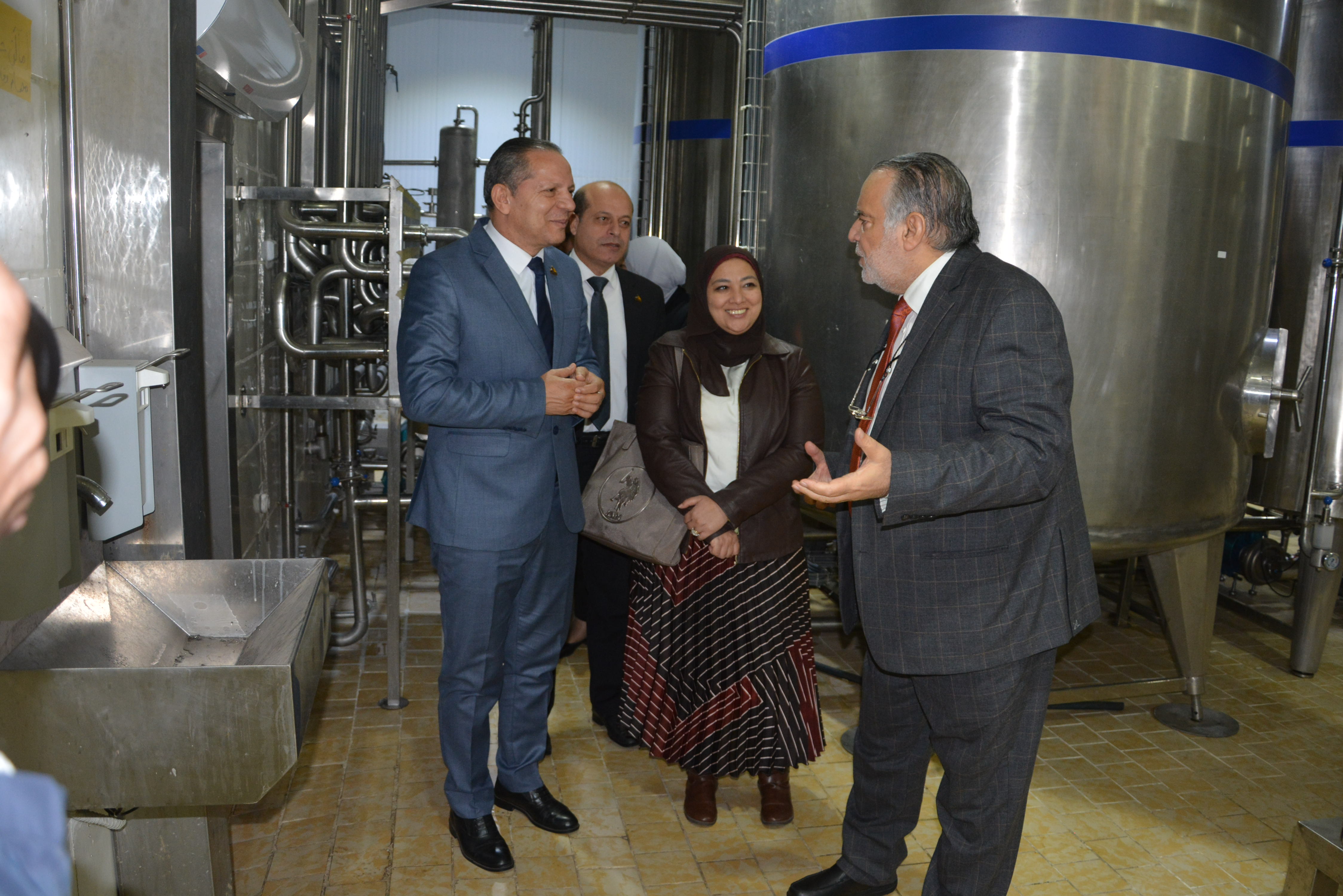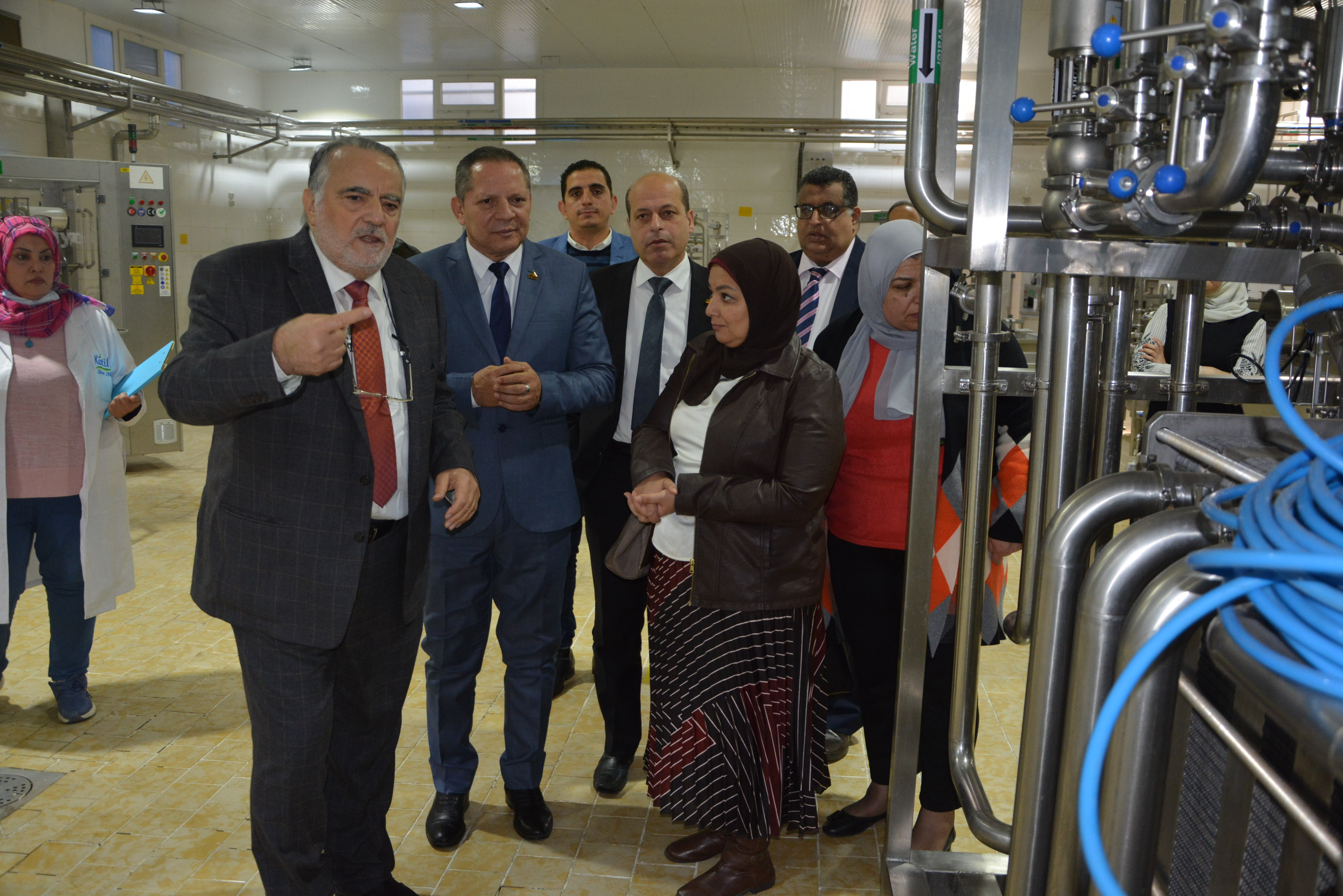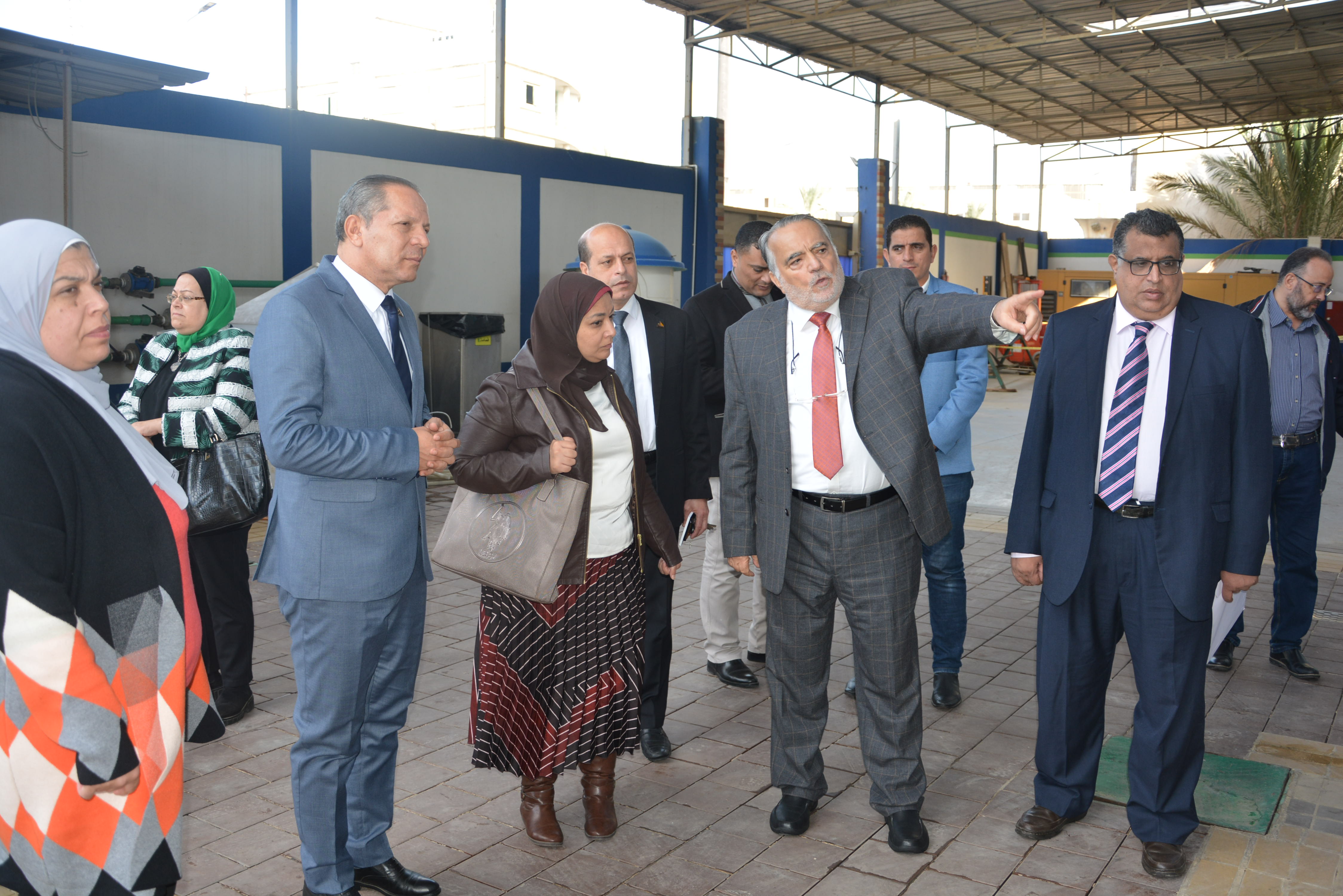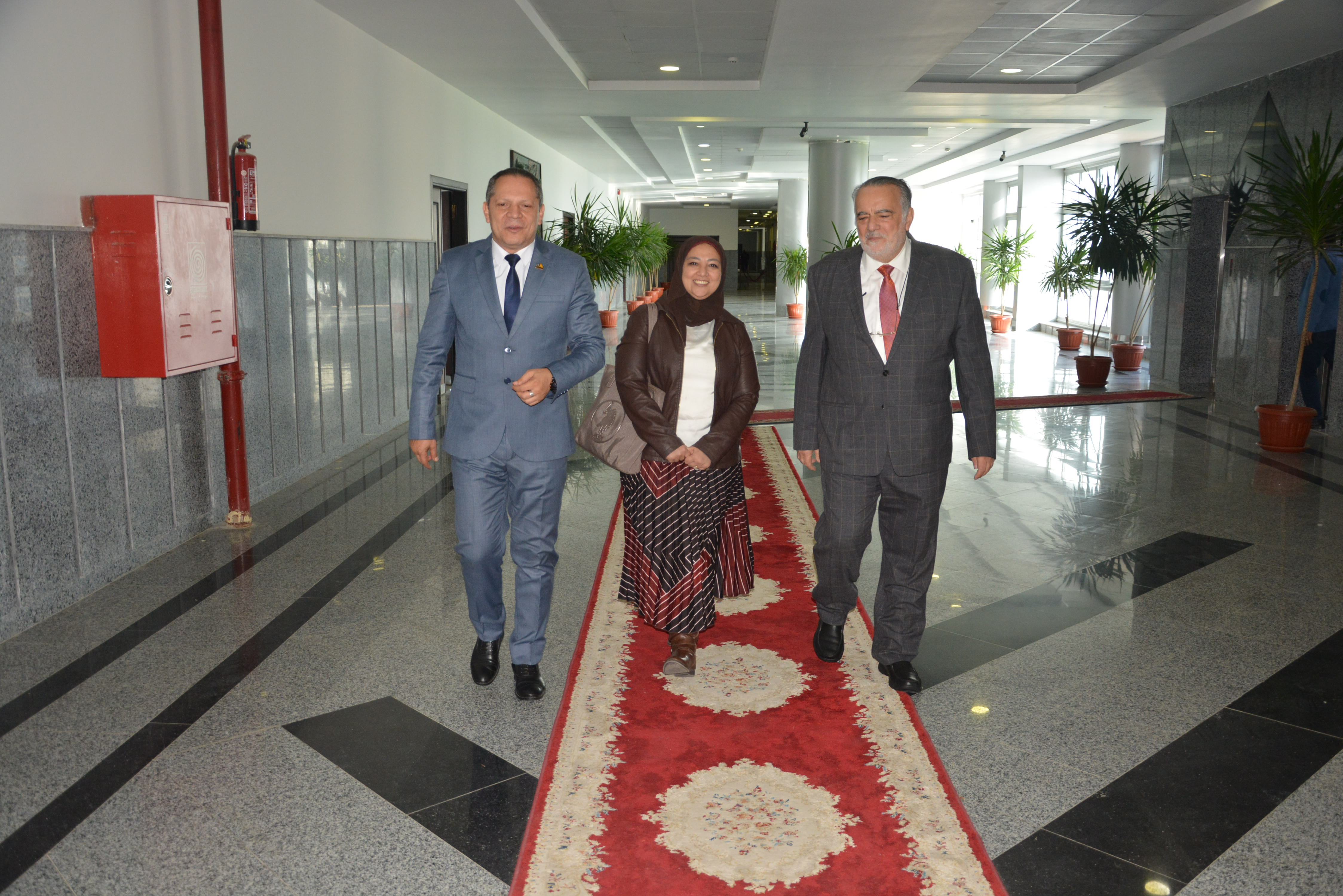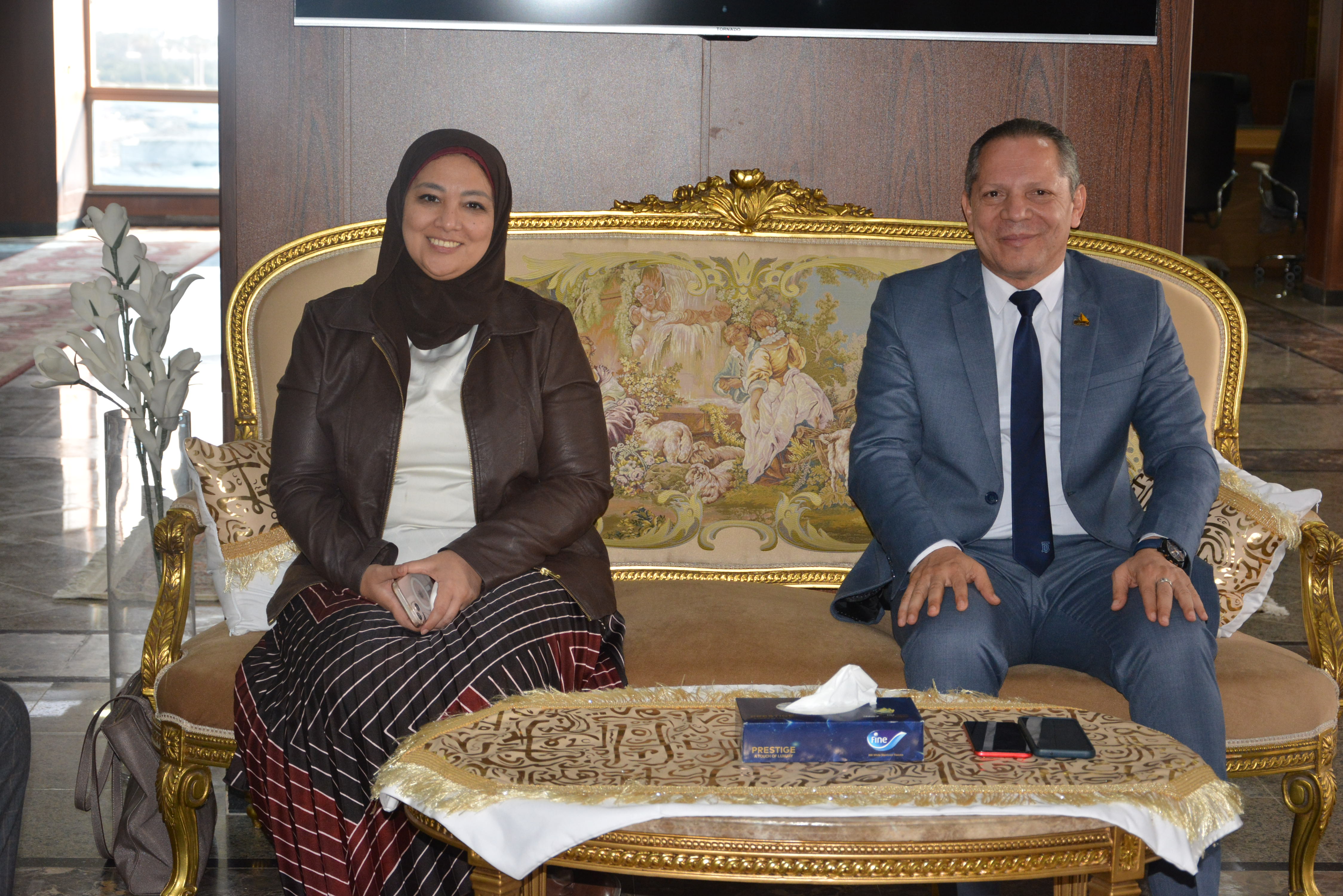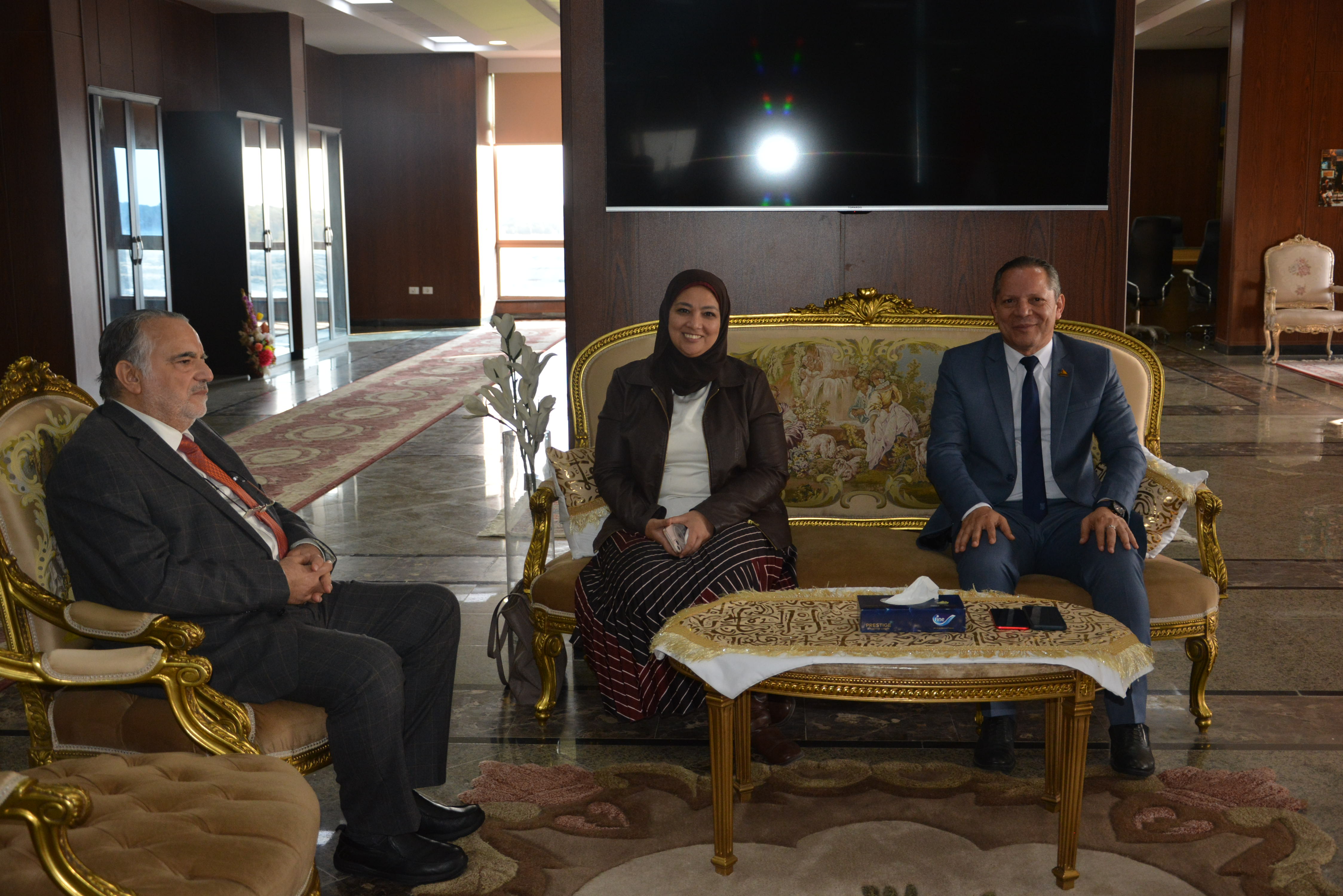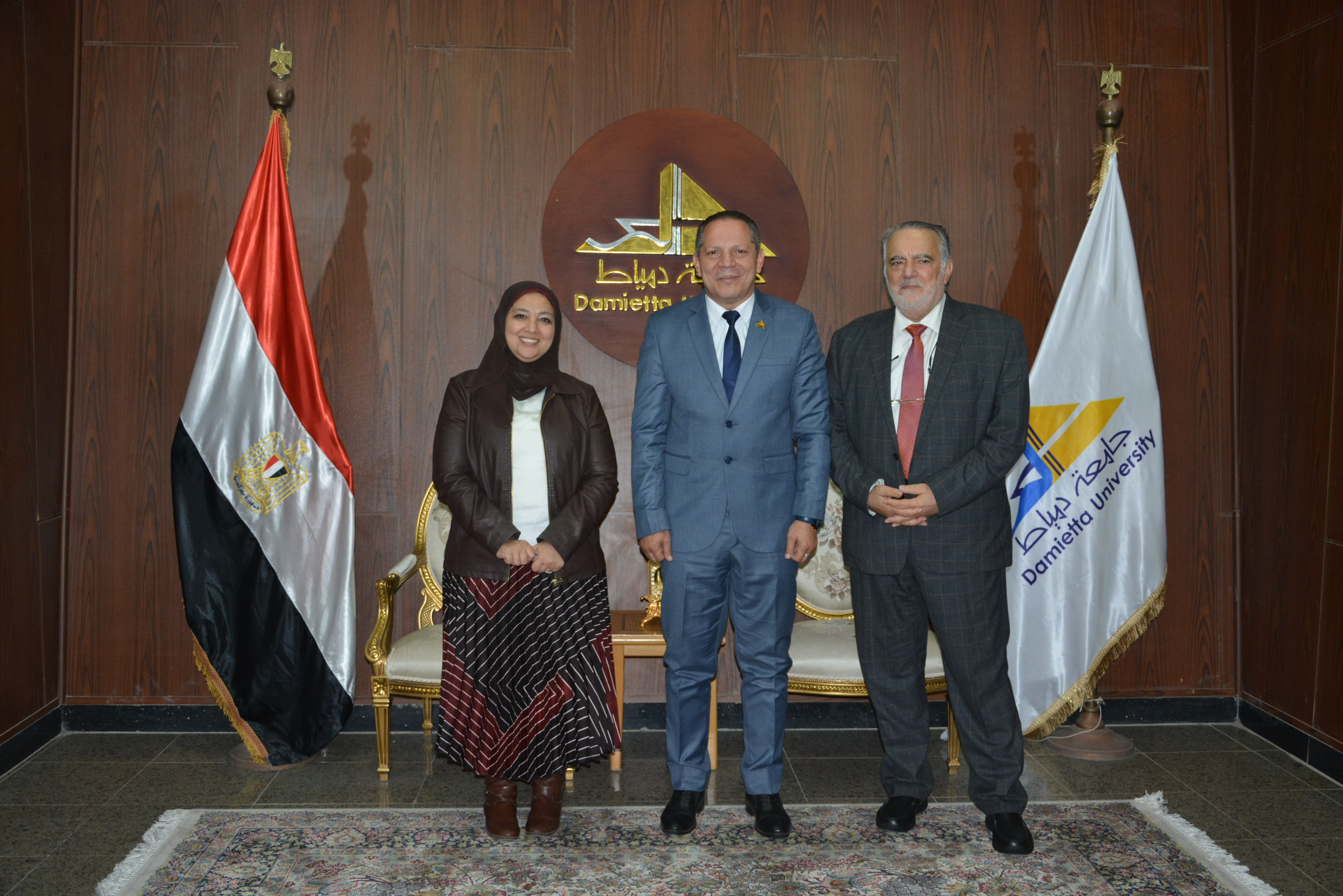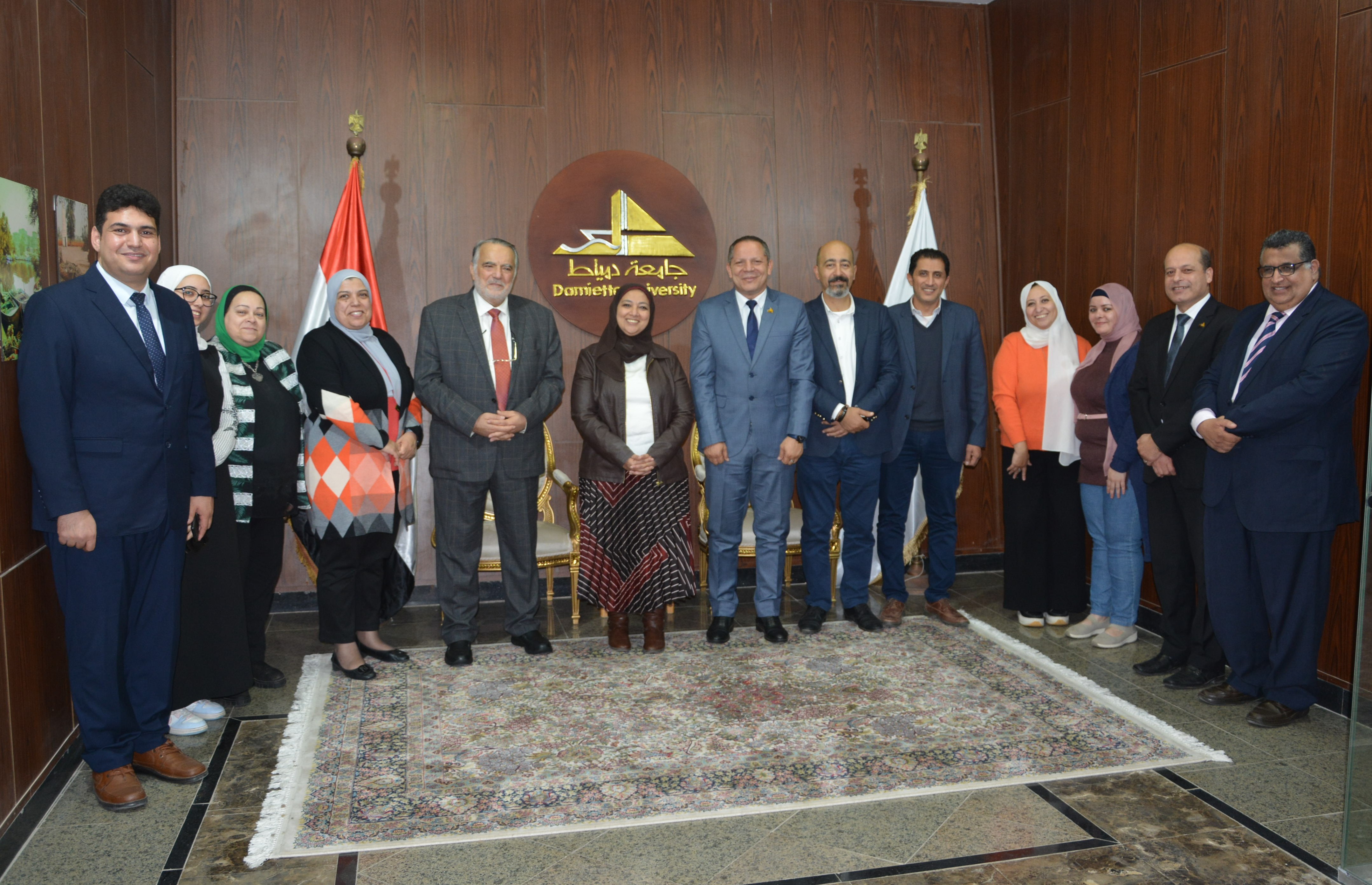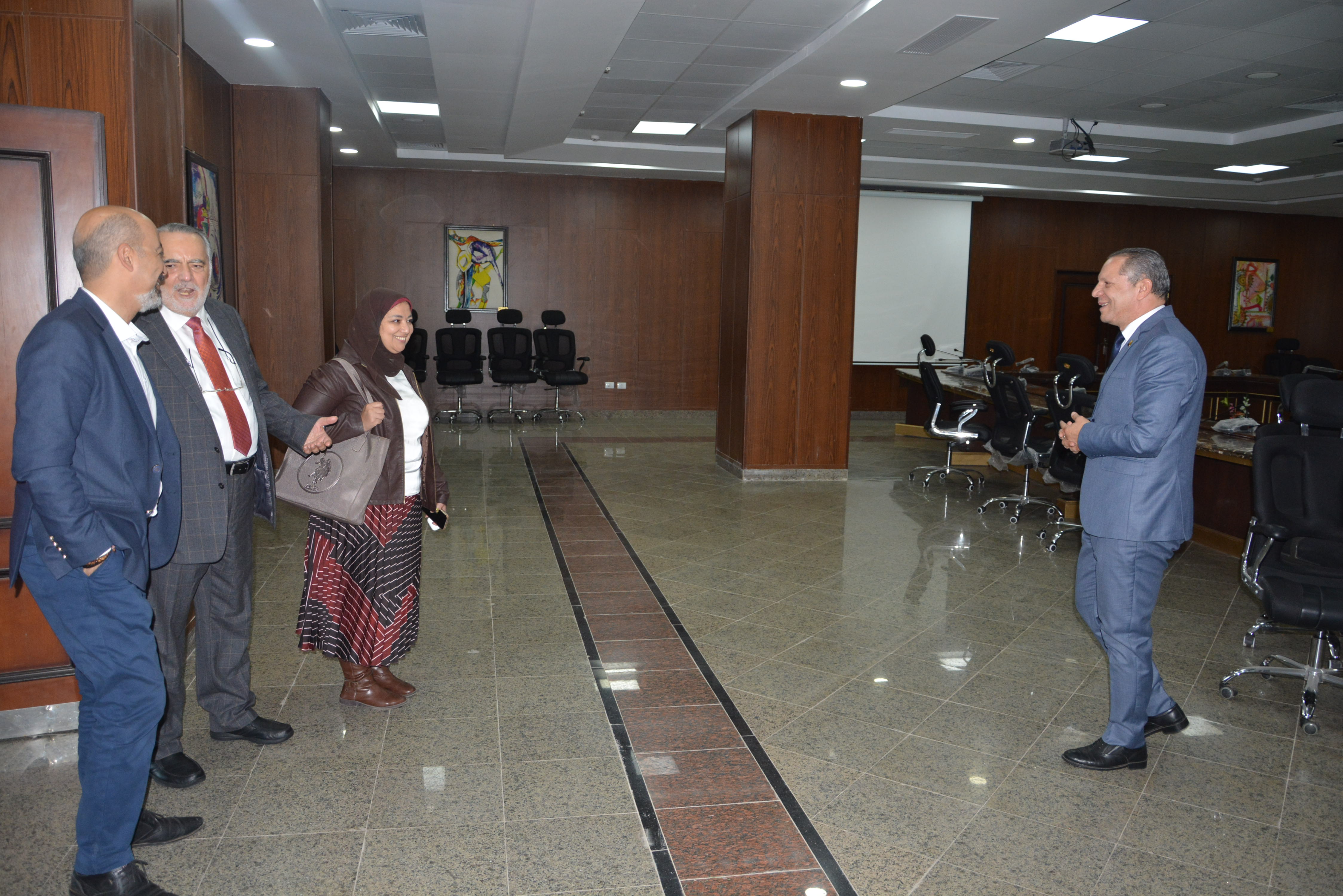Within the framework of strengthening Damietta University in serving the surrounding community, Professor Dr. Hemdan Rabie Al-Metwally, President of the University, today, Sunday, December 1, 2024, visited the Katilo Dairy Factory in New Damietta, in the presence of a delegation from the Academy of Scientific Research and Technology headed by Professor Dr. Gena Al-Feky, President of the Academy, to discuss ways to establish National dairy factory at Damietta University. He accompanied the university president during his visit and was received by Professor Dr. Al-Metwally Salim, Dean of the Faculty of Agriculture, Professor Dr. Sherif Al-Kady, Vice Dean of the Faculty of Agriculture for Postgraduate Studies and Research, and Professor Dr. Khaled Abdel Fattah, Director of the Center for Research Excellence in Advanced Agricultural Sciences. The Academy of Scientific Research and Technology delegation also included a number of academy officials, including Dr. Hiam Helmy, supervisor of the Technical Evaluation Office, Dr. Tamer Hamouda, supervisor of the Marketing and Innovation Sector, Dr. Mohamad Al-Ameer, supervisor of the regional centers, and Dr. Amal Ashour, head of the Central Administration for Financial Projects. This visit comes within the framework of the cooperation between the Academy of Scientific Research and Technology, Damietta University, and dairy industry, with the aim of establishing and developing a regional laboratory for research and development in the field of dairy industry at Damietta University, funded by the Academy of Scientific Research and Technology. During the visit, Professor Dr. Hemdan Rabie Al-Metwally, President of the University, and the delegation of the Academy of Scientific Research and Technology, in the presence of Eng. Abd Al Moneim Katelo, inspected all stages of the manufacturing process to know closely the production methods and modern equipment in the factory. During the meeting, the parties discussed the mechanisms for establishing the National Dairy Laboratory at the university. The National Dairy Laboratory project aims to support the dairy industry and solve the challenges facing this vital sector through several mechanisms, including improving the quality of raw milk and developing its collection and preservation techniques, in addition to supporting small and medium factories to improve production and reduce waste. The project also focuses on enhancing scientific and technical research in the field of the dairy industry, by conducting applied scientific research to improve manufacturing techniques, and studying ways to create value-added dairy products. It also aims to enhance production efficiency by providing technical and scientific consultations to dairy manufacturers, which contributes to enhancing the competitiveness of local products in local and international markets. On the other hand, the project attaches great importance to building human capabilities by training students and graduates in the fields of dairy manufacturing, and qualifying cadres specialized in quality control and ensuring food safety. The project also seeks to enhance sustainability by reducing dependence on imports, increasing local production, and supporting national efforts to achieve Self-sufficiency and increased export. Following the end of the visit to the Qatilo Dairy Factory, a delegation from the Academy of Scientific Research and Technology, headed by Professor Dr. Gina Al-Feki, President of the Academy, and Professor Dr. Hemdan Rabie, President of the University, went to inspect the research centers at Damietta University, led by the
“The Center For Excellence in Research of Advanced Agricultural Sciences” CERAAS
It is worth noting that the Center of Research Excellence in Advanced Agricultural Sciences includes two phases. The first phase of the center includes the electron microscope and chromatographic analysis laboratory, in addition to the central laboratory, The transmission electron microscope unit is one of the most important units included in the center, and it is the latest of its kind in Egyptian universities and research centers. The transmission electron microscope unit aims to serve the surrounding industrial community, such as the New Damietta Industrial Zone, the Damietta Free Zone, and the Damietta Port Authority.
The second phase of the center includes many laboratories affiliated with the center’s units, which are:
1-Water Sustainability & Agricultural Systems Research Lab.
2-Food and Feed Quality & Analysis Lab.
3-Agricultural Biotechnology Research Lab.
4-Molecular Biology Research Lab.
5-Spectroscopy Lab.
The second phase of the center aims to:
Examination and diagnosis of animal and plant tissues, detection of viral infections such as the Corona virus, examination and diagnosis of cancerous cells and tumors, examination of medical drug compounds and emulsions, detection of pesticide residues in food, feed and water, estimating and identifying active compounds in plant extracts, detecting the degree of purity of medicines and medicinal drugs in foods and milk, separating and estimating amino acids, proteins, nucleic acids, medicines, pesticides, antibiotics and steroids, determining aflatoxins, which are among the most dangerous types of toxins in imported foods, feeds and foodstuffs, Measuring the concentration of heavy metals in water, liquid waste, food, feed, petroleum raw materials and oils, monitoring the quality of food and feed to serve food factories in the surrounding area as well as poultry farms and fish farms.
, quality control in dairy plants to analyze milk to up to six standards and check for adulteration within minutes.Within the framework of strengthening Damietta University in serving the surrounding community, Professor Dr. Hemdan Rabie Al-Metwally, President of the University, today, Sunday, December 1, 2024, visited the Katilo Dairy Factory in New Damietta, in the presence of a delegation from the Academy of Scientific Research and Technology headed by Professor Dr. Gena Al-Feky, President of the Academy, to discuss ways to establish National dairy factory at Damietta University. He accompanied the university president during his visit and was received by Professor Dr. Al-Metwally Salim, Dean of the Faculty of Agriculture, Professor Dr. Sherif Al-Kady, Vice Dean of the Faculty of Agriculture for Postgraduate Studies and Research, and Professor Dr. Khaled Abdel Fattah, Director of the Center for Research Excellence in Advanced Agricultural Sciences. The Academy of Scientific Research and Technology delegation also included a number of academy officials, including Dr. Hiam Helmy, supervisor of the Technical Evaluation Office, Dr. Tamer Hamouda, supervisor of the Marketing and Innovation Sector, Dr. Mohamad Al-Ameer, supervisor of the regional centers, and Dr. Amal Ashour, head of the Central Administration for Financial Projects. This visit comes within the framework of the cooperation between the Academy of Scientific Research and Technology, Damietta University, and dairy industry, with the aim of establishing and developing a regional laboratory for research and development in the field of dairy industry at Damietta University, funded by the Academy of Scientific Research and Technology. During the visit, Professor Dr. Hemdan Rabie Al-Metwally, President of the University, and the delegation of the Academy of Scientific Research and Technology, in the presence of Eng. Abd Al Moneim Katelo, inspected all stages of the manufacturing process to know closely the production methods and modern equipment in the factory. During the meeting, the parties discussed the mechanisms for establishing the National Dairy Laboratory at the university. The National Dairy Laboratory project aims to support the dairy industry and solve the challenges facing this vital sector through several mechanisms, including improving the quality of raw milk and developing its collection and preservation techniques, in addition to supporting small and medium factories to improve production and reduce waste. The project also focuses on enhancing scientific and technical research in the field of the dairy industry, by conducting applied scientific research to improve manufacturing techniques, and studying ways to create value-added dairy products. It also aims to enhance production efficiency by providing technical and scientific consultations to dairy manufacturers, which contributes to enhancing the competitiveness of local products in local and international markets. On the other hand, the project attaches great importance to building human capabilities by training students and graduates in the fields of dairy manufacturing, and qualifying cadres specialized in quality control and ensuring food safety. The project also seeks to enhance sustainability by reducing dependence on imports, increasing local production, and supporting national efforts to achieve Self-sufficiency and increased export. Following the end of the visit to the Qatilo Dairy Factory, a delegation from the Academy of Scientific Research and Technology, headed by Professor Dr. Gina Al-Feki, President of the Academy, and Professor Dr. Hemdan Rabie, President of the University, went to inspect the research centers at Damietta University, led by the
“The Center For Excellence in Research of Advanced Agricultural Sciences” CERAAS
It is worth noting that the Center of Research Excellence in Advanced Agricultural Sciences includes two phases. The first phase of the center includes the electron microscope and chromatographic analysis laboratory, in addition to the central laboratory, The transmission electron microscope unit is one of the most important units included in the center, and it is the latest of its kind in Egyptian universities and research centers. The transmission electron microscope unit aims to serve the surrounding industrial community, such as the New Damietta Industrial Zone, the Damietta Free Zone, and the Damietta Port Authority.
The second phase of the center includes many laboratories affiliated with the center’s units, which are:
1-Water Sustainability & Agricultural Systems Research Lab.
2-Food and Feed Quality & Analysis Lab.
3-Agricultural Biotechnology Research Lab.
4-Molecular Biology Research Lab.
5-Spectroscopy Lab.
The second phase of the center aims to:
Examination and diagnosis of animal and plant tissues, detection of viral infections such as the Corona virus, examination and diagnosis of cancerous cells and tumors, examination of medical drug compounds and emulsions, detection of pesticide residues in food, feed and water, estimating and identifying active compounds in plant extracts, detecting the degree of purity of medicines and medicinal drugs in foods and milk, separating and estimating amino acids, proteins, nucleic acids, medicines, pesticides, antibiotics and steroids, determining aflatoxins, which are among the most dangerous types of toxins in imported foods, feeds and foodstuffs, Measuring the concentration of heavy metals in water, liquid waste, food, feed, petroleum raw materials and oils, monitoring the quality of food and feed to serve food factories in the surrounding area as well as poultry farms and fish farms.
, quality control in dairy plants to analyze milk to up to six standards and check for adulteration within minutes.
Within the framework of strengthening Damietta University in serving the surrounding community, Professor Dr. Hemdan Rabie Al-Metwally, President of the University, today, Sunday, December 1, 2024, visited the Katilo Dairy Factory in New Damietta, in the presence of a delegation from the Academy of Scientific Research and Technology headed by Professor Dr. Gena Al-Feky, President of the Academy, to discuss ways to establish National dairy factory at Damietta University. He accompanied the university president during his visit and was received by Professor Dr. Al-Metwally Salim, Dean of the Faculty of Agriculture, Professor Dr. Sherif Al-Kady, Vice Dean of the Faculty of Agriculture for Postgraduate Studies and Research, and Professor Dr. Khaled Abdel Fattah, Director of the Center for Research Excellence in Advanced Agricultural Sciences. The Academy of Scientific Research and Technology delegation also included a number of academy officials, including Dr. Hiam Helmy, supervisor of the Technical Evaluation Office, Dr. Tamer Hamouda, supervisor of the Marketing and Innovation Sector, Dr. Mohamad Al-Ameer, supervisor of the regional centers, and Dr. Amal Ashour, head of the Central Administration for Financial Projects. This visit comes within the framework of the cooperation between the Academy of Scientific Research and Technology, Damietta University, and dairy industry, with the aim of establishing and developing a regional laboratory for research and development in the field of dairy industry at Damietta University, funded by the Academy of Scientific Research and Technology. During the visit, Professor Dr. Hemdan Rabie Al-Metwally, President of the University, and the delegation of the Academy of Scientific Research and Technology, in the presence of Eng. Abd Al Moneim Katelo, inspected all stages of the manufacturing process to know closely the production methods and modern equipment in the factory. During the meeting, the parties discussed the mechanisms for establishing the National Dairy Laboratory at the university. The National Dairy Laboratory project aims to support the dairy industry and solve the challenges facing this vital sector through several mechanisms, including improving the quality of raw milk and developing its collection and preservation techniques, in addition to supporting small and medium factories to improve production and reduce waste. The project also focuses on enhancing scientific and technical research in the field of the dairy industry, by conducting applied scientific research to improve manufacturing techniques, and studying ways to create value-added dairy products. It also aims to enhance production efficiency by providing technical and scientific consultations to dairy manufacturers, which contributes to enhancing the competitiveness of local products in local and international markets. On the other hand, the project attaches great importance to building human capabilities by training students and graduates in the fields of dairy manufacturing, and qualifying cadres specialized in quality control and ensuring food safety. The project also seeks to enhance sustainability by reducing dependence on imports, increasing local production, and supporting national efforts to achieve Self-sufficiency and increased export. Following the end of the visit to the Qatilo Dairy Factory, a delegation from the Academy of Scientific Research and Technology, headed by Professor Dr. Gina Al-Feki, President of the Academy, and Professor Dr. Hemdan Rabie, President of the University, went to inspect the research centers at Damietta University, led by the
“The Center For Excellence in Research of Advanced Agricultural Sciences” CERAAS
It is worth noting that the Center of Research Excellence in Advanced Agricultural Sciences includes two phases. The first phase of the center includes the electron microscope and chromatographic analysis laboratory, in addition to the central laboratory, The transmission electron microscope unit is one of the most important units included in the center, and it is the latest of its kind in Egyptian universities and research centers. The transmission electron microscope unit aims to serve the surrounding industrial community, such as the New Damietta Industrial Zone, the Damietta Free Zone, and the Damietta Port Authority.
The second phase of the center includes many laboratories affiliated with the center’s units, which are:
1-Water Sustainability & Agricultural Systems Research Lab.
2-Food and Feed Quality & Analysis Lab.
3-Agricultural Biotechnology Research Lab.
4-Molecular Biology Research Lab.
5-Spectroscopy Lab.
The second phase of the center aims to:
Examination and diagnosis of animal and plant tissues, detection of viral infections such as the Corona virus, examination and diagnosis of cancerous cells and tumors, examination of medical drug compounds and emulsions, detection of pesticide residues in food, feed and water, estimating and identifying active compounds in plant extracts, detecting the degree of purity of medicines and medicinal drugs in foods and milk, separating and estimating amino acids, proteins, nucleic acids, medicines, pesticides, antibiotics and steroids, determining aflatoxins, which are among the most dangerous types of toxins in imported foods, feeds and foodstuffs, Measuring the concentration of heavy metals in water, liquid waste, food, feed, petroleum raw materials and oils, monitoring the quality of food and feed to serve food factories in the surrounding area as well as poultry farms and fish farms.
, quality control in dairy plants to analyze milk to up to six standards and check for adulteration within minutes.
